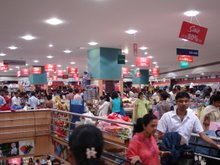Why Wal-Mart entry can disrupt India
Sorry, but I've never been a big fan of Wal-Mart's business practices. I love the stores--they're the first place I go when I run out of glue and kitty litter--and I even owned the stock some years ago. But Wal-Mart's aggressive attitude toward suppliers and its impact on small business give me an uneasy feeling in the pit of my stomach. It's a bit how I feel when I see a Rottweiler sniff a kitten. Is it going to lick the kitty, or turn it into lunch? Wal-Mart's plans to invade India give me just that kind of lump-in-the-gut feeling. Sure, it makes a great deal of economic sense, and I'm sure it fits squarely into the whole concept of "globalization," "free markets," and other mom-and-apple-pie platitudes. The company has signed a memorandum of understanding with an Indian company, Bharti Enterprises, to explore business opportunities in the country. That's about as specific as it gets, but I can see them now: big boxes dotting the Indian landscape. Think of it: morning at the Taj Mahal, afternoon buying glue! What's wrong with that picture? Plenty, in my view. As a business decision, it is a terrific one from Wal-Mart and Bharti's perspective. The statistics are, as they usually are for India, massively intimidating. Network Magazine, an Indian business publication, observes in its current issue that retailing is India's largest industry, accounting for over 10% of the country's gross domestic product and around 8% of employment. "The Indian retail industry is valued at about $300 billion and is expected to grow to $427 billion in 2010 and $637 billion in 2015," says the magazine. Only 2% to 3% of that is "organized." That is, actual stores instead of open-air markets, roadside stands and other beneficiaries of India's relaxed attitude toward urban planning. That sound you hear is retail executives drooling. There's no question that Wal-Mart's fabled "efficiencies of scale" and modern distribution methods would be a breath of fresh air (so to speak) in India, with its rampant inefficiency and corruption. Indeed, Wal-Mart is not the only major retailer sniffing around India. India's own Reliance Group plans to expand its chain of supermarkets in India, though they are far more limited in scope than Wal-Mart's big-box business model. What troubles me about Wal-Mart's India move concerns the potential for social disruption. There are 12 million people working in retail in India, ranging from operators of boutiques to the fellows who sell "cold water" on the streets of Delhi. I think the water guy and the kid selling fresh coconut juice in Mumbai don't have much to worry about (avoid the water, but try the coconut juice, by the way). What troubles me are the "organized retail" shops, which are often run by the same family for generations. What happens to their businesses and what happens to the markets--or bazaars as they are known in Farsi-derived Hindi? In India, "Main Street" is not a street, but a bazaar. Delhi alone has dozens, ranging from Old Delhi's Chandni Chowk--a real bazaar in the Middle Eastern sense of the word--to roadside hovels to upscale markets like the two in Greater Kailash. In Central Market, a sprawling shopping district in South Delhi, you can get a suit made, order world-class opticals, buy dates from Saudi Arabia or, for that matter, buy pretty much anything else you could want. The merchants are competitive with each other, usually, and Delhi shoppers will go from shop to shop, bargaining for a better deal. In other words, the bazaar is an institution, a way of life. And, in the view of a growing number of people in India, it is endangered by Wal-Mart. The opposition comes from quarters that are, I suppose, predictable: some elements of the ruling Congress Party, trade unions, the Communist Party and, of course, the merchants themselves. The rhetoric has been remarkably similar to what you usually hear when a big-box store comes to a small town. "We believe Wal-Mart is going to ruin this country and millions of people will lose their jobs," one anti-Wal-Mart organizer told Reuters. The difference is that when people lose their jobs in India, they sometimes starve. I think the opponents to Wal-Mart in India have a point. It's easy to view such opposition as politically motivated or the griping of people opposed to progress. But then I think about a family friend, now in his 40s, who as a boy used to work in his father's parchun store, selling dried beans, rice and spices along the train tracks leading south out of Delhi. His father ran the store before him. Today he is one of the leading real estate developers on the outskirts of Delhi.I tend to doubt that he would be in that position if he had spent his youth mopping up aisle 9 at the Greater Kailash Wal-Mart. Admittedly, I am tilting at windmills here. The Indian government, responding to the protests, is launching an inquiry into the social and economic effects of big-box retailers moving into the country. But I am sure Wal-Mart is inevitable. The march of progress cannot be impeded. The small merchants of India will have to compete, or be crushed. Globalization must, ultimately, triumph. After all, as one supporter of the deal once pointed out to me--what about outsourcing to India depriving Americans of jobs? Don't get all sentimental about a few million Indians losing their jobs, he told me. He's right, I guess. But somehow the thought of that comeuppance, or all that economic efficiency, can't make that knot in the pit of my stomach go away.
Courtesy: http://in.rediff.com
For more detail on Retail India visit: www.retailindia.tv

No comments:
Post a Comment